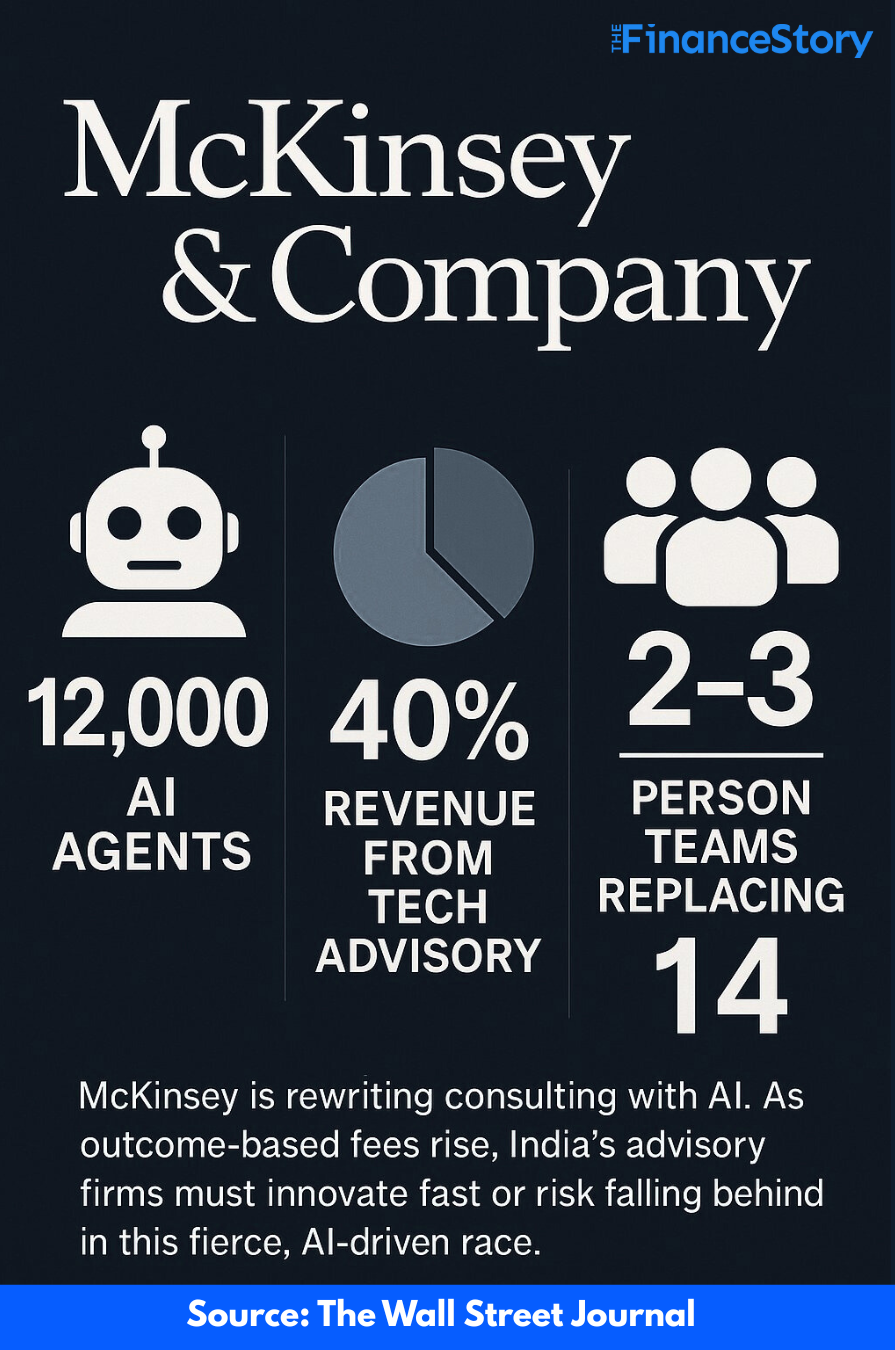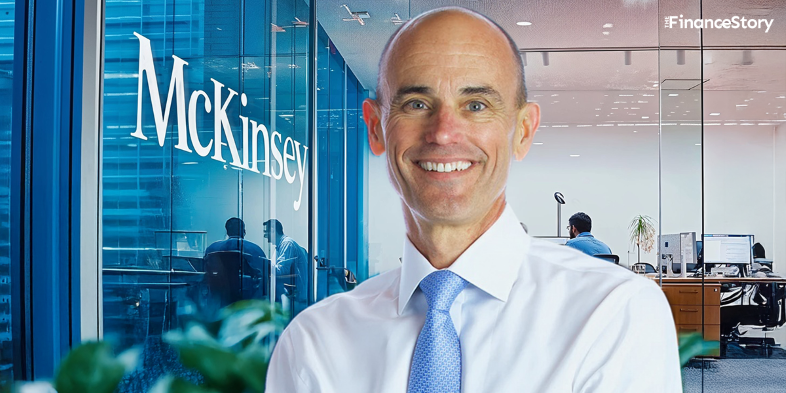- McKinsey employees have new co-workers: they are 12,000 AI agents.
- What used to take 14 consultants? Now, needs just 2–3 people plus some AI agents.
- 25% of their projects are now outcome-based, meaning fees paid on outcomes, not hours (WSJ!)
- McKinsey is stepping into niche arenas like leadership development dominated by boutique firms.
AI at McKinsey’s core: Meet Lilli
Lilli, the “AI colleague”, was launched firm-wide in July 2023.
Think of her as a McKinsey-trained GPT, powered by over 100 years of the firm’s proprietary insights.
Lilli is embedded in the daily workflow of over 70% of McKinsey’s staff, slashing 30% off their grunt work time.
She has quietly reshaped how 40,000 professionals collaborate, access knowledge, and deliver client impact.
Usage stats speak volumes
- Over 500,000 prompts issued monthly
- Saving around 50,000 consulting hours every month (Source: Dev Community)

McKinsey is selling AI too
While Lilli powers the firm internally, McKinsey’s QuantumBlack Horizon (Created by QuantumBlack, AI) is transforming client industries with AI.
QuantumBlack Horizon is McKinsey’s AI and machine learning platform that helps businesses rapidly develop, deploy, and scale AI solutions across their operations.
Other AI tools from McKinsey include:
- OptimusAI: Boosts plant performance in heavy industries
- LifeSciences.AI: LifeSciences.AI provides a patented AI toolkit that supports pharmaceutical, biotech, and medtech companies across the entire value chain.
- Value Maximiser: Prevents supply chain disruptions before they happen
- Insurance AI: It provides scalable AI solutions that help insurers improve underwriting accuracy, streamline claims processing, and boost customer engagement.
- Iguazio Platform: Helps clients roll out generative AI at scale. (acquired in 2023)
It’s paying off….
Now 40% of McKinsey’s revenue comes from AI and tech advisory, contributing to its $16 billion estimated revenue in 2024, second only to Accenture.
Also read: Capgemini disrupts outsourcing/BPO industry with AI agents
McKinsey’s AI Revolution cost jobs?
Since 2023 (yes, same year Lilli was launched), McKinsey has also cut 5,000+ jobs, taking headcount from 45,000 to 40,000.
Partly a correction after pandemic over-hiring, partly due to the impact of AI.
But McKinsey insists it’s not replacing humans, it’s redefining roles.
Global Managing Partner Bob Sternfels told WSJ, “We’re going to continue to hire, but also continue to build agents.”
Next-gen McKinsey Consultant?
McKinsey CEO Bob Sternfels, in a conversation with WSJ, said the consultant of tomorrow:
- Must learn faster than ever before “at a rate you and I have never seen.”
- Collaborate seamlessly with both humans and AI agents.
- Deck-making & data crunching will be automated, but the Human edge is leadership, persuasion, and navigating office politics will be consultants’ biggest strengths!
- McKinsey’s vision: every consultant gets a personal AI agent.
Also read: OpenAI launches consulting division…Making Mckinsey, Accenture, Big 4s nervous
However, this isn’t just about McKinsey….
This is a signal flare for the entire advisory ecosystem, including India’s booming tax and consulting firms.
The hyper-competitive & booming advisory landscape in India is shifting fast.
Fees are shrinking rapidly: A senior Big 4 risk advisory leader based in Gurgaon said:
“Assignments that once fetched ₹20-25 lakh are now executed for ₹10-12 lakh. Margins and timelines are under constant pressure.”
Outcomes-based deliverables: Another senior professional from a top boutique due diligence firm in Mumbai adds:
“Clients expect measurable results, not just billed hours. Outcome-based advisory will be the norm in India starting soon!”
Now, with AI too entering the picture, there is a real need for an AI strategy for firms of all sizes.
Even employees should have an AI strategy for their careers.

Small & boutique firms have an edge in the AI race…
Hywel Ball, former EY UK chair and industry veteran, told the Financial Times that the Big Four face major internal hurdles in adopting AI.
Yes, Billions must have been invested by the Big 4, but there is a serious AI Adoption gap!
On the contrary, mid-sized and boutique firms are seizing opportunities by being more agile and AI-native.
He also made it clear that AI-driven transformation will lead to “job reshaping”, not just elimination.
But a big question remains….
As the Wall Street Journal puts it:
“If AI can analyse information, crunch data, and deliver a slick PowerPoint deck within seconds, how does the biggest name in consulting stay relevant?”
FAQs
1. What Are “Management Consulting Firms”?
Management consulting firms assist organisations in resolving complex business challenges, enhancing performance, and implementing effective strategies.
Services include:
- Strategy & growth planning
- Operations improvement
- Organizational restructuring
- Tech & digital transformation
- M&A advisory
- ESG & risk consulting
2. Who are McKinsey’s top competitors?
| Firm | Revenue | Employees |
| McKinsey & Company | $16 billion (2024) | 40,000 (Approx.) |
| Boston Consulting Group (BCG) | $13.5 billion (2024) | 37,000 |
| Bain & Company | $6 billion (2023) | 19,000 |
| Oliver Wyman | $3.4 billion (2024) | 7,000 |
| Roland Berger | €1 billion (2023) | 3,500 |
3. Is AI replacing McKinsey consultants?
Not entirely. While junior roles are evolving, AI is being used to augment, not replace, human expertise, especially in leadership, change management, and collaboration.
4. What is an AI agent?
An AI agent is a computer program that can operate independently to accomplish tasks. It can gather information, figure out what to do, and take action without you telling it every single step, without the help of humans.







